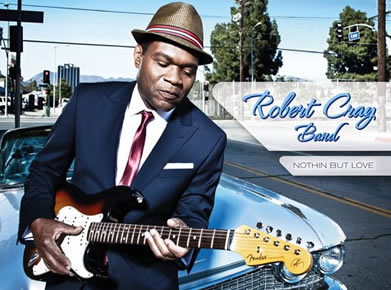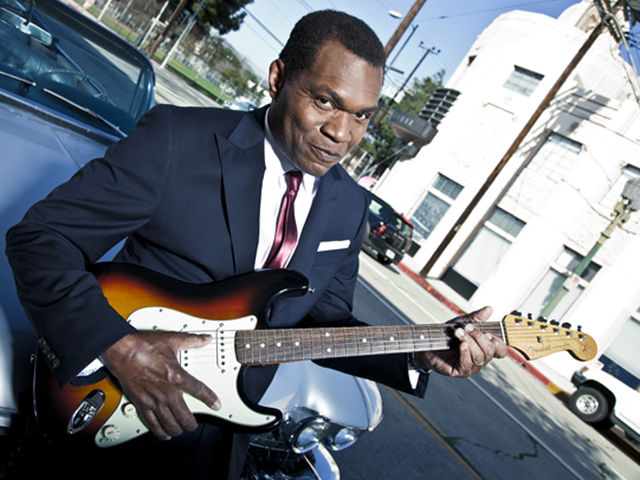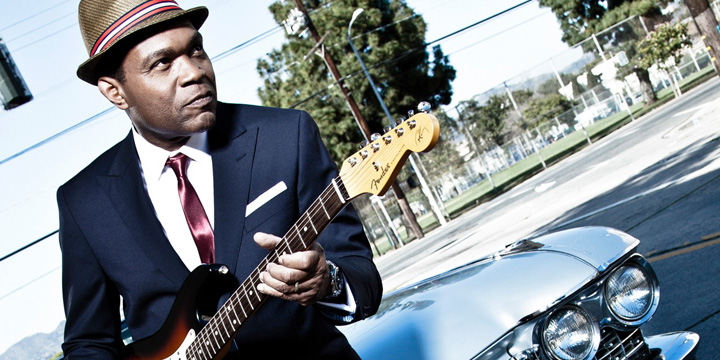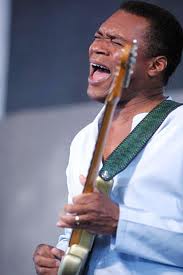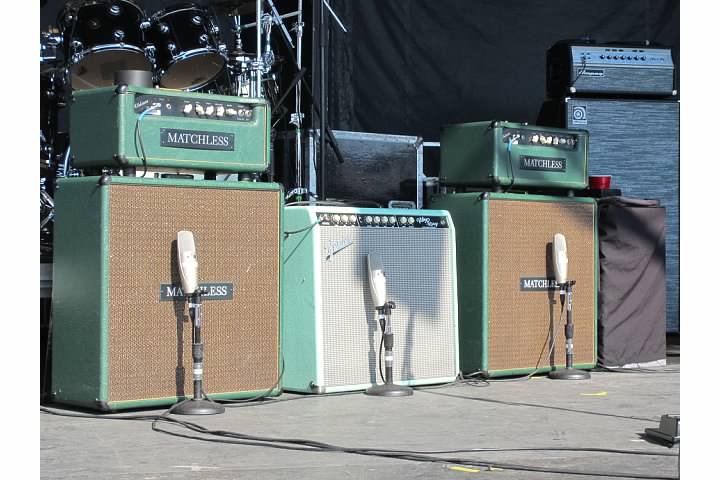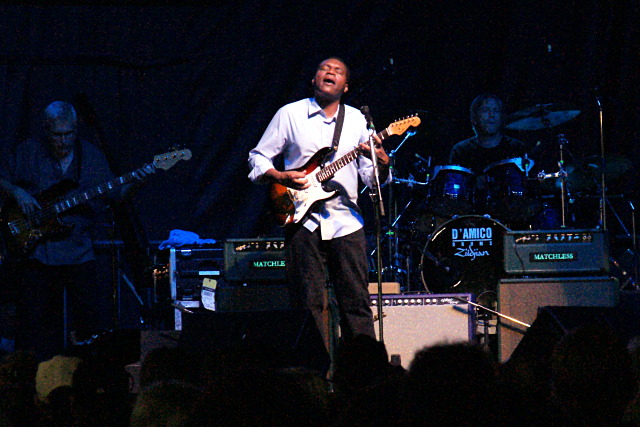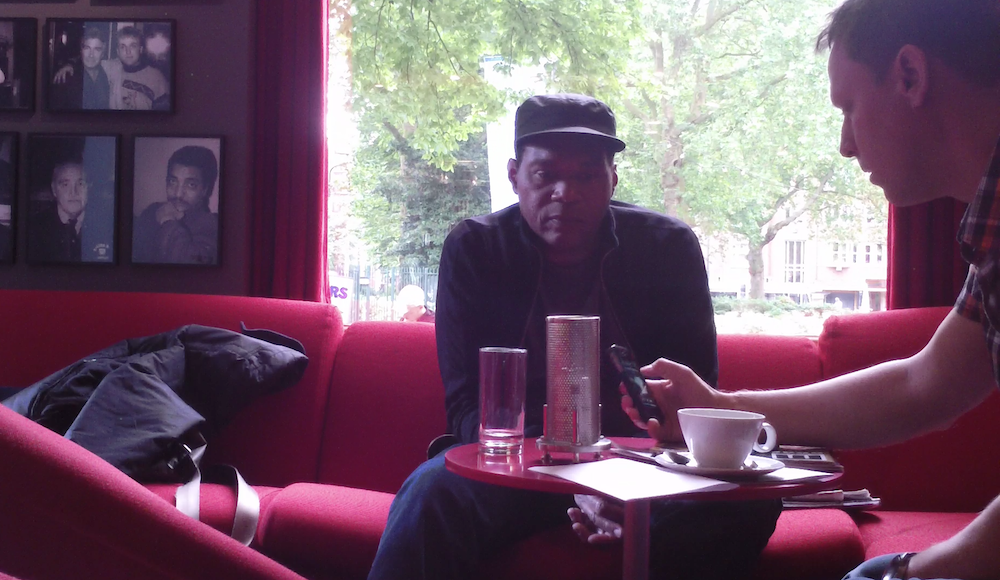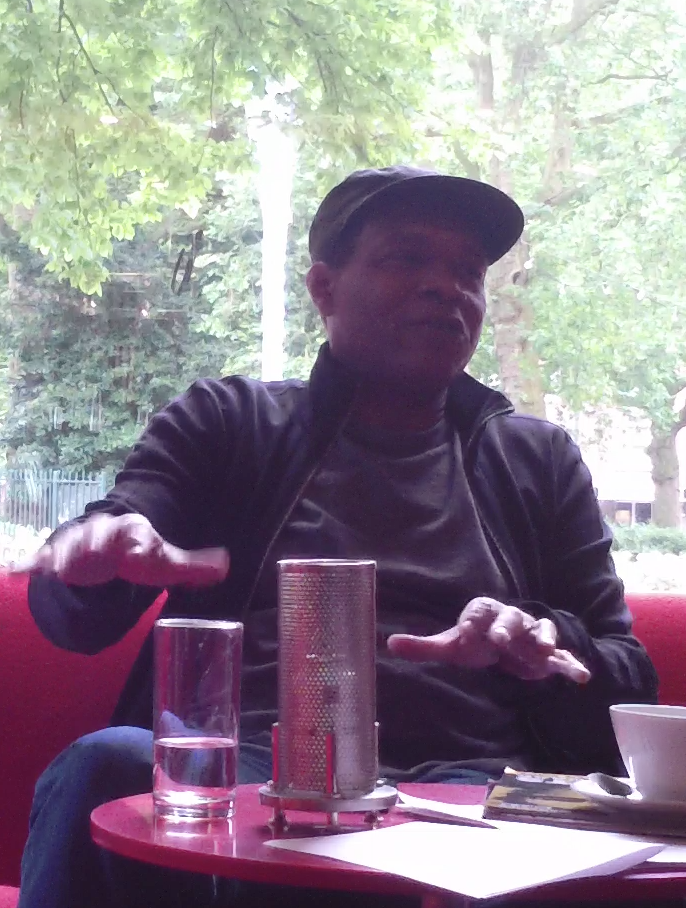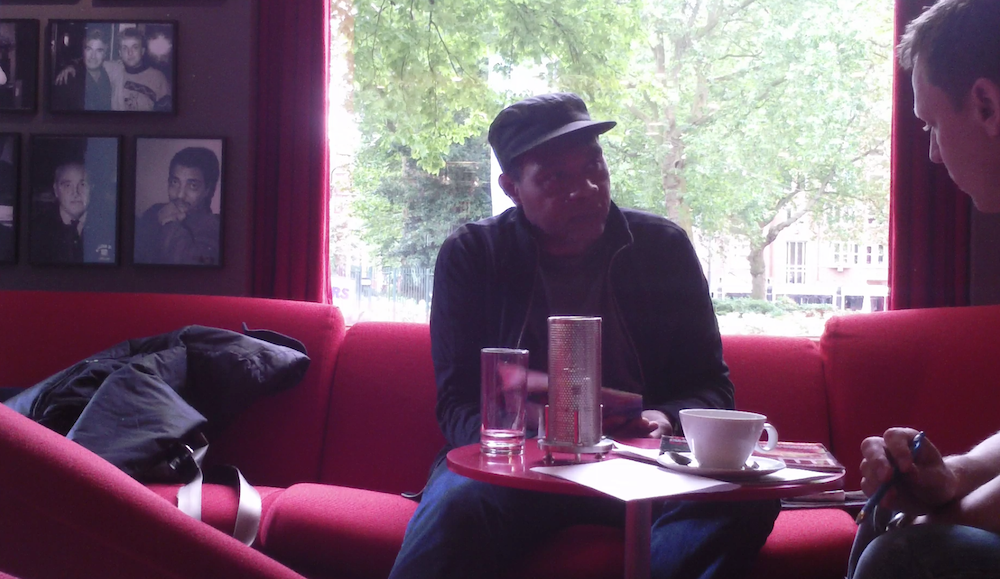Music Maker asked me to interview Robert Cray on a really short notice. Luckily, I was aware of Cray’s albums and I got his latest release ‘Nothing But Love’ just in time for the interview in my mailbox. This interview was done july 20th 2012, 11:30 am. There were just a couple of people interviewing the 5-times grammy winner Cray that morning and I had a whole hour, so it all looked good. Cray was the soft-spoken gentleman as insiders might know him and we spoke about all the subjects I had prepared. This interview was printed over 4 pages in the november 2012 issue of Music Maker. The version below is the unedited version as it went down.
Copyright Richard Hallebeek and Music Maker 2012. Copying or use elsewhere without the clear approval of the author is strictly prohibited.
Cafe Americain photo’s by Richard Hallebeek. Copyright 2013 Music Maker.
:: Didn’t you play in Groningen? It says on the list here.
No, we’re going to play. Yeah, these are coming in october. It was just North Sea Jazz. That was almost two weeks ago. About two weeks ago. It was good. We hadn’t been at North Sea for quite some time, before that, you know.
:: Do you still play live without a setlist?
That’s exactly right. Yeah.
:: That sounds like something you have to get used to and then it might get comfortable.
Well, you know it is..
:: At least for me I know it would take some getting used to.
(laughter) I think it’s nice to not have a setlist because when you go up on stage and you don’t know what’s gonna be next, it keeps us on our toes, you know. We have a master list, just in case we get caught. You know, with..
:: How many songs are on that list?
Right now there’s close to.. there’s 40-something songs on the list I think, yeah. And we try to add to it whenever we get a chance to do soundchecks and things like that.
:: You’ve been playing for so long with your band members, do you still do any rehearsals for a tour like this?
We don’t really have that kind of time because we’re all in different places really. We have our crew that’s up in the pacific north west and like Portland-Oregon, two of us living near Santa Barbara in California, one lives in Los Angeles and our bass player lives in Zurich in Switzerland. So we all get together for the first show and then we fly into the first place and take a coach to the other gigs, so we try to get the rehearsal in at soundcheck. You know, if we haven’t been out for a long time then we’ll get some rehearsal time, yeah.
:: Then it must be fun to meet up with everybody and see each other again as old buddies.
Yeah, it is.
:: How was the response from the audience at North Sea?
It was good! We played after George Benson and George was on at like 9, and then we went on at like 11 or 11:30 or something like that and there was a lot of other things going on in different advance but we had a pretty good crowd for ourselves at that particular time, because that’s a late slot, you know.
:: You played in the big hall, right?
Yeah, we played in the big hall.
:: You still play with the same band you always play with.
Yeah, most of the time I play with a steady band. This line up has been the same line up since the end of 2008. Where our bass player Richard Cousins came back into the band and we added the drummer Tony Braunagel into the band. But our keyboard player Jim Pugh has bee in the band since 1989.
:: That’s the same band from your last album “Nothin’ But Love”, right?
Right.
:: I got an advance copy of that album, without any liner notes. I understood from your webpage there’s 5 songs from you, one cover and the rest from the other guys.
Right. And we can go through those songs if you want to.
:: Yes, please.
The first song ‘Won’t Be Coming Home’ is written by our bass player Richard Cousins and Hendrix Ackle. Then the song ‘Worry’ is written by our keyboard player Jim Pugh and our drummer Tony Braunagle.
:: If you go to the studios with those songs, is there something like a chart or anything or is it all by ear?
There is a chord chart, but that’s it. Chord charts for the songs. We went into rehearsal the week before going into the studio and before going into rehearsal we’ve gone out and played as the band for like 12 days. And so everybody was..
::Warmed up.
Yeah, and then we learned the new material. And then we went straight into the recording studio. I don’t think we’ve ever done that before. We’ve always like.. you know, had rehearsals with the new songs, and then went into the studio, the chops weren’t up, you know? It was just like learning the songs so I think this time the energy level came through on the record because of it, that we did it the way we did.
:: OK, and what about the other songs?
The next song ‘I’ll Always Remember You’ is a song written by our keyboard player Jim Pugh. And do you have the list of the songs?
:: I didn’t bring the album with me.
Ok, I can just tell you. And then..
:: There’s A Memo ::
‘A Memo’ was written by Richard Cousins and Hendrix Ackle once again. Then there’s ‘Side Dish’, which is a song that I wrote. And then there is ‘Blues Get Of My Shoulder’, it’s a cover song by Bobby Parker. It was released by him I think in the late ’50’s. And then the rest of the songs I wrote. Fix This and the other ones, I can’t remember the titles. (laughs)
:: What was it like to work with new producer Kevin Shirley (Journey, Iron Maiden, Rush, Led Zeppelin) and why did you choose him?
Kevin Shirley I only met after talking to the people at Provogue. And Kevin’s been working with the people at Provogue. And when I talked to Ed van Zijl from the label, he asked if I would take a meeting with Kevin to see if maybe we could work together. Because he likes what Kevin had been doing.
:: Were you aware of Kevin Shirley at that time?
I wasn’t even aware of Kevin’s work. And so I had a meeting with Kevin and then we talked about how.. we’d like to go.. he likes to work in the studio which was the same way I like to go and we go in and try to capture the essence of the song, hopefully in one take. But it takes two or three max.
:: So it’s live for everybody?
Yeah, we record live with the band, we’re all in the same room. And then of course, there’s overdubs.
:: Solos and vocals most probably?
Yeah. And that’s how we did it. And so that jived with me. I produced some of our albums before and our drummer Tony Braunagel is a producer and so is our keyboard player (laughs) and so I thought it was a great idea that we have somebody else come and take over. Because the last time I produced I had two other producers over my shoulder (laughs) it was great, because Kevin was there, we didn’t know him really, we never had the experience of working with him in the studio. What I found with Kevin was that he’s got big ears, you know. He was able to come up with a lot of great suggestions on how we could re-arrange some of the arrangements that we already thought we had down, which is a problem with the band. We’re producers. It’s good to have an outsider, Kevin had great ideas and..
:: Can you give me an example of one of the ideas he came up with?
Let me think of one of the songs.. well, one of the main suggestions he had was the cover song ‘Blues Get Off My Shoulder’. It was his idea to do that. Which was a song that we all knew, I mean, we were acquainted with and it was Kevin’s idea to do that song. And.. his arrangement of it. So that’s a good example I think.
:: Anything else he came up with?
He came up with the strings for ‘I’m Done Crying’. So that was a great idea. Because he hadn’t heard any of the material. Until we came into the studio. He made adjustments really quickly. Thinks really quick on his feet, you know? And he would.. he’d get the best out of us, you know. He would do things that maybe I wouldn’t have done. Tony, I want you to play more cymbal, don’t overplay, things like that, you know. I might have said something like that, but maybe not (laughs)
:: Yeah, it’s always good if an outsider says something like that!
Yeah, it is! It’s good.
:: This album sounds like a typical Robert Cray album, is this album different for you in any way from your other work?
This album, to me, is about the subject matter. Where we talk about subjects that are more current and mean more to people of our age group now. I guess when you get older, you start thinking about your world around you. You start thinking about your kids which is the case in the song ‘Worry’ that Jim Pugh wrote. He being a father of four. About the housing crisis that’s going on in America, the mortgage fiasco. ‘Great Big Old House’ is about a neighbor of ours, down the street who lost her home to foreclosure. The presidential goings-on with ‘A Memo’ that’s written by Richard. So 20 to 25 years ago, we wouldn’t have been talking about that stuff. Yeah, I think it sounds more believable when you speak about this stuff when you’re a bit older.
:: Yeah. I liked ‘A Memo’. It think it was a great example of the typical Robert Cray style, blues melted with pop and soul. I was surprised it was not written by you.
Yeah, Richard is an old-school Cray band guy, so .. he knows the Cray sound probably better then me.
:: I was reading some of your older interviews and one topic that seems to be returning time after time is the categorization thing. People just wanna put you in a box. You’re not a real blues guy, because your voice is too much soul, then there’s too much pop influences..
..they try to put you in a box while you just try to be yourself. (laughs)
:: You have to fit in a cd store..
..in a category, yeah. (laughs) it is funny these days what you find in the blues category, there’s so much there..yeah, and you know.. well.. the ambassador BB King has been playing the jazz festivals for a long time, and you can understand that. But I think the reason why the jazz festivals and the blues festivals are adding big name pop artists is they need to draw now. I think that’s what’s hurting. When you think about the days of the jazz festivals, the early days, maybe of the North Sea Jazz Festival, when Miles Davis would be there or Dizzy Gillespie, when all the old timers were around, that’s changing and there’s a new garde. And the new garde is bringing in a whole different sound. The new garde, wether it’s in blues or in jazz, or bringing in the pop elements.. people like you and I, we grew up listening to on the radio. Not only with the music that you enjoy playing but you’ve heard a lot of other things and that’s how it is for me. I think that nowadays the people who do the festivals and stuff, are aware of the style of people of our generation and so they’re bringing in those people, to help the draw. In order to bring in the younger crowds.
:: Do you notice any of that at your concerts?
Yeah, the walls are coming down. A band like ours, who used to get.. you guys don’t play the blues.. stuff like that, now everybody’s doing what we’re doing, you know. People are bringing their R&B thing into it and bringing their more rockier edge into it and all, whatever, wherever they came from before they got into the blues. That kind of thing. (laughs)
:: Are you aware of any of the new players who mix up styles, like Scott Henderson?
I don’t know Scott Henderson.
:: Do you listen outside of your style, players like Pat Metheny or Allan Holdsworth?
I’ve met Pat a long time ago and I saw him at crossroads in Dallas. Pat’s music is great. I know who Holdsworth is, but I’m not familiar with his playing. I’ve got Grant Green records at home and stuff like that.. (laughs)
:: What kind of music do you enjoy listening to? Can you mention the last five albums you bought?
One of the albums that I’ve bought was, because I’ve been buying used albums in shops, one of which is a Sarah Vaughan record that’s got Clifford Brown on trumpet. Stuff like that or Richard Groove Holmes and jazz organist or trio stuff, got some Ahmad Jamal records. I have a varied taste.
:: What’s your currend setup like? You play the Matchless amps, right?
Yeah, I have two Clubman 35’s in my setup and they have 4 x 10’s in each box. And then in the middle.. I run the Matchless amps at the same time. And the reason why I run the Matchless at the same time is because my guitar tech Greg Zaccaria made a rack mounted unit that has the Magnitone, the old magnitone amplifiers that had the true vibrator. And it’s a vibrato that actually bends the note.
:: So you play that one in stereo?
I can play it in stereo. And then when I’m not using those, I run the Vibro King in the middle and run that separately for a little bit dirtier sound on the stage.
:: So you don’t use all three at once?
No. It’s either the middle or the two outside.
:: Do you use reverb from an amp?
No, I’ll use reverb.. I have an TC electronics unit that I use.. (that’s the TC Electronic 2290 – Rich) I found one of the delay settings, so I’ll use a delay sometimes and the reverb out of that. I used to use a Peavey reverb with the spring loaded thing, but it doesn’t travel well (laughs) and once again, like I said, now I use the vibrato which you can adjust the speed and the depth on that.
:: You have a pretty basic set up. Was there ever a time that you found yourself experimenting with pedals and equipment?
I have a pretty basic set up. When I was a teenager, I had a little fuzz box stuck into the guitar, but that was it.
:: I think you always had a clear idea in your head of the sound you wanted.
Yeah, and it was more in tune with the kind of stuff we’re doing, the R&B and the blues thing. I have fun sometimes, when there’s a song that we play called ‘A Lof Of Lovin’ and I turn the delay on that and I get to play a solo and it’s repeating itself and stuff like that. And then I’ll take the pick and slide it down the fretboard. Do all that stuff for the fun of it. And I own a wah-wah pedal, that I can not get back from my keyboard player (laughs)
:: You have your own guitar tech?
Yeah, Greg Zaccaria, we call him Zack, we’ve been working together.. close to 25 years.
:: Your Fender signature guitar. There was a custom shop model and since 2003 there is a regular model out. What is the difference between those two?
Right. Well, the commonality is the pickups. The pickups are all from the custom shop. On both models. And then after that, there would be the difference of the body and the wood and they assembled it in Mexico. For the regular one. And the other one is in the custom shop in California.
:: Sometimes a Mexican strat or one from the Far East might be even better. My first strat was a Mexican, because it was just the best sounding strat in the store.
Oh yeah, yeah. There was.. years ago we were on a tour in Japan and I went into a guitar shop and I bought a stratocaster for like a 125 bucks or something like that. Way back then, I think it’s back in the ’70’s or something. And it was a red one. And it just had.. the radius was just right, you know. And then I took it and plugged it in and it didn’t sound very good so back then I went and bought a set of Dimarzio pickups and stuck it in there. And then everybody wanted to play that guitar. We had a second guitar player at that time, Tim Kaihatsu and he was always playing it. And then, when Stevie Ray Vaughan was around and he’d come to some of the gigs and then he played it. And I also played that guitar on ‘Hail, Hail Rock & Roll’, (1987 documentary film directed by Taylor Hackford – Rich) that’s the red and white one if you’ve ever seen that. I used it there, on that. And then on one of the Crossroads festivals, I donated that guitar, for auction, for the crossroads event, we got 14000 bucks for it (laughs) which is fantastic. I bought it for a 125 bucks! (laughs)
:: When you were younger, you took some lessons. How much of the stuff you do and play is actually by ear or do you actually do with a theoretical background? Like pentatonic box shapes?
It’s all by ear now, you know. When I started playing guitar, I still had the memory of reading music from when.. I took piano lessons for a little while. So that was good. And.. that was really handy because I was doing sight reading really well. But after that I mean, I didn’t.. I didn’t. It was just like hanging out with the guys and playing and learning licks., that kinda thing. My reading chops are nihil.
:: Are you aware of any pentatonic box shapes you are playing?
It’s all by ear. Yeah. I don’t even think in terms of pentatonic boxes (laughs)
:: When you write songs at home, do you have any setup to store your ideas?
.. I.. no I don’t. I have a cassette player and a pencil and paper. (laughs)
:: The good old fashioned way.
Good old fashioned way. And at one point I borrowed a thing, a machine from our keyboard player Jim that I could patch in a drumbeat and stuff like that and I’d play bass and I’d play guitar and I could get everything.. so I could present the ideas to the guys. And then years ago I used to put my ideas to a tape recorder, play something and then I’d have another tape recorder have that playing while I recorded again and just go back and forth so I got the whole song. I am going to.. because I live in a place where I have a barn and I’m going to build a studio. So I can get all my gear in there. Just have a simple machine so I can..
:: It’s pretty easy now with a computer setup.
Yeah.
:: You have played with a lot of legendary guys, like John Mayer, Eric Clapton, John Lee Hooker.. I would imagine getting kind of nervous being on stage with people of that caliber.
Yeah. It’s pretty nerve-wracking. But the thing is, if you’ve been invited to be on that stage, it’s because they like what you do, so as much as you can, remain calm (laughs) and just do what you do. Do not overplay, stay in the moment, play the song. You know, and everything will be just fine. Don’t think you’re gonna get up onstage and cut Eric Clapton, ’cause it won’t happen. (laughs)
:: There a video of you playing with John Lee Hooker where you took a couple of rounds solo. You seemed to know exactly where, it all felt right.
Yeah. The thing that was great about John Lee Hooker is, he has his own style. He didn’t play in 12-bar format a lot of the time. The lesson was, with him, you had to follow John, ’cause he might do like 9 bars, changes of 14 bars, he had his own way of doing stuff. And that’s the John Lee Hooker sound, you know. He’s a really cool guy.
:: What did you learn from playing with John Mayer and Eric Clapton?
I haven’t played with John..
:: You have at crossroads.
Oh, the big jam, right. I played more with Eric. And Eric is great Eric is really.. he is a guy who just is all about the song. And he’s very.. real considerate and really good guy. You know, to play music with and to.. we’ve wrote a song together, he’s recorded one of my tunes. And you know, just a good guy. So what guitars and amps do you play?
:: I play Hook amps and Suhr guitars. Eric Gales is playing on my new album. Do you know him?
I met him, yeah. Great player. I’d seen his name more recently, but I hadn’t seen his name for a long time. And I remember seeing his name.. hearing his name that he was out of Memphis. Then I wondered what happened to him. Because he was on the scene for a bit.
